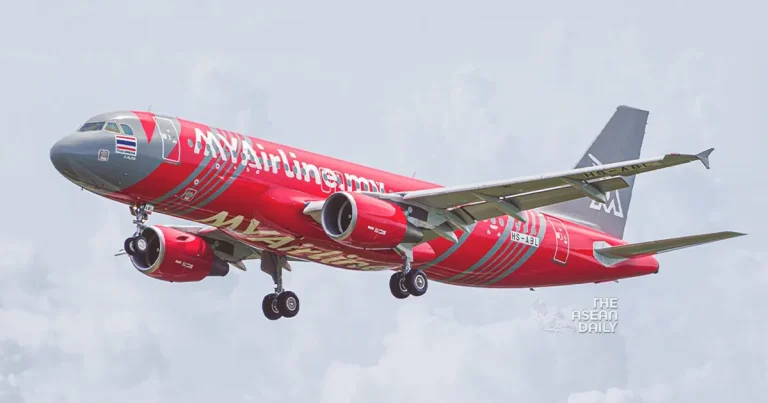26-10-2023 (KUALA LUMPUR) A prominent police investigation has amplified concerns surrounding the relatively unknown businessman, Allan Goh Hwan Hua, with implications that extend far beyond the recent collapse of budget airline MYAirline. The probe has now expanded to encompass alleged money laundering, unlicensed deposit-taking schemes, and fraud.
This burgeoning investigation into Mr. Goh’s business dealings is presenting a thorny governance challenge for Prime Minister Anwar Ibrahim’s administration, especially at a time when foreign investor confidence in Malaysian financial markets has been dwindling.

Of primary concern is how Mr. Goh, a businessman whom Malaysian government insiders privately admit has been under the scrutiny of multiple regulatory agencies for the past two years, managed to obtain approvals to operate an airline. Transport Minister Anthony Loke has publicly questioned the circumstances under which the MYAirline license was granted by the previous government just days before Anwar’s inauguration as Prime Minister on November 24 last year.
Loke has also criticized the Malaysia Aviation Commission (MAVCOM) for the abrupt shutdown of MYAirline’s operations on October 12. This closure left over 10,000 passengers stranded as unmanned ticketing counters at the airport on a day when 39 flights were scheduled. The fallout from MYAirline’s closure includes the airline owing passengers over RM25 million (S$7.17 million) in pre-booked tickets. MYAirline commenced operations in early December 2022, offering scheduled services between Kuala Lumpur, Kota Kinabalu, Kuching, and Langkawi. It later expanded its operations to Thailand and Bangkok, with plans to grow its fleet from nine to 26 aircraft by the end of 2023.
MAVCOM has stated that it is cooperating with the government in the ongoing investigation.
Recent police actions have further exacerbated the situation, as Mr. Goh, his wife Neow Ean Lan, and their son Sean Goh Tze Han were arrested last week. Subsequently, their bank accounts were frozen, and luxury assets were seized as part of investigations into alleged money laundering and fraud. The Gohs have since been released on police bail.
In a recent development, an unnamed individual was apprehended this week in connection with the ongoing investigations, which have now also expanded into a controversy-ridden e-commerce firm, known as i-Serve Online Mall, primarily owned by the Gohs.

Mr. Goh, known for his low-key business profile and close ties to the senior leadership of the Malaysian Chinese Association (MCA), which is the country’s long-established ethnic Chinese party, holds a 31.7 per cent stake in i-Serve Online Mall. Through other privately held entities with unconventional names, such as Zillion Wealth and Trillion Cove Holdings, Mr. Goh effectively controls 98 per cent of MYAirline.
Even before MYAirline’s abrupt cessation of operations two weeks ago, Mr. Goh had already come under the scrutiny of various Malaysian enforcement agencies. In November 2021, authorities, led by the central bank, Bank Negara Malaysia, carried out a multi-agency operation targeting companies affiliated with the i-Serve Online Mall group. This operation resulted in the freezing of 45 accounts in seven banks and the seizure of RM118 million. Subsequently, in early September this year, Bank Negara publicly disclosed that i-Serve Online Mall and seven of its affiliates had been fined RM50 million for accepting deposits without a license and enticing investors with high monthly returns. This action was taken against offenses committed by the company between June 2018 and September 2021.
During the same period, Mr. Goh was also embroiled in a legal battle with investors in i-Serve Online Mall who were demanding the return of their deposits, which were placed in schemes promising monthly returns of up to two per cent each month. Mr. Goh is currently contesting this legal action, with a hearing scheduled at the Malaysian High Court on November 22.
Officials from the finance ministry, who are familiar with the ongoing investigation, have revealed that Prime Minister Anwar has received several appeals from groups of investors who lost their deposits in i-Serve Online Mall.
This week, Malaysian police have disclosed that investigators are scrutinizing financial documents to trace potential fund flows between i-Serve Online Mall and MYAirline. In the wake of the latest arrest, authorities have also frozen 15 bank accounts.
MYAirline’s recent troubles represent the latest setback in Malaysia’s beleaguered aviation sector, struggling with five operators in a relatively small domestic market. In addition to these issues, legacy financial problems stemming from the pandemic persist. National carrier Malaysia Airlines (MAS) continues to grapple with severe financial difficulties and relies on continuous capital injections from the government.
Recent weeks have also brought bad news for financially distressed AirAsia X Bhd (AAX), Malaysia’s medium-haul low-cost carrier, which is battling to maintain its listing status on the Malaysian stock exchange. Authorities have extended its classification as a financially distressed entity, commonly referred to as PN17. Both AAX and its associated airline, Capital A (formerly AirAsia Group Bhd), entered PN17 status in October 2021 and January 2022, respectively, due to the losses incurred during the Covid-19 pandemic, which substantially eroded shareholder equity.
The stock exchange authorities have not provided reasons for extending the PN17 status for both airlines, but industry analysts point to the increased scrutiny brought on by the troubles faced by MYAirline.




